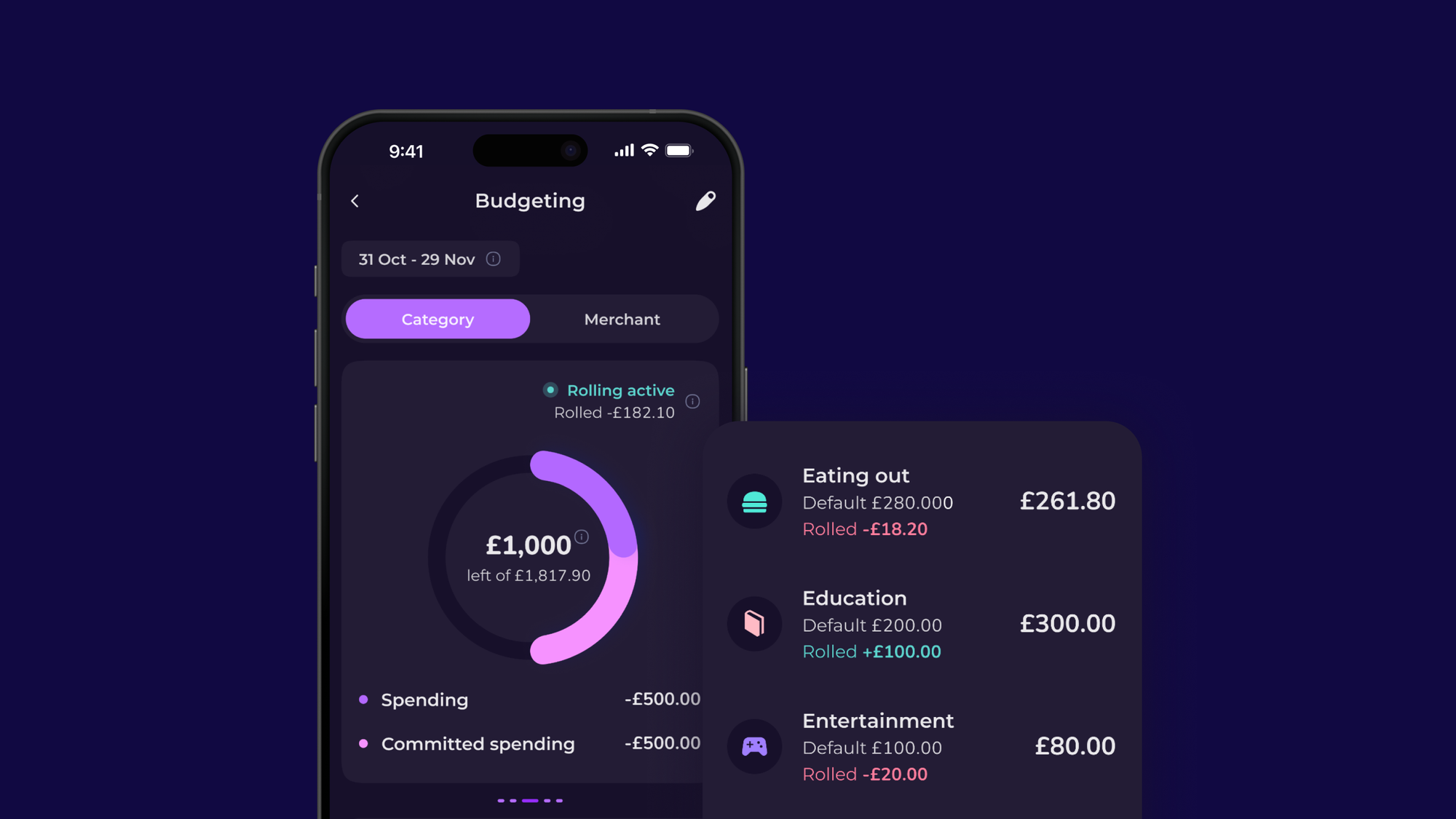FEATURED ARTICLE
Six Ways You Can Take Control Of Your Money Right Now

Rebekah May
November 4, 2020 •6 min read
TABLE OF CONTENTS
1. Tell Your Money Where To Go
2. Get Into A Good Routine
3. Ask For Help
4. Reduce Your Outgoings
5. Top Up Your Knowledge
6. Let Yourself Live
We’re all bound to go through points in our life where we feel like we’re not in control.
When it comes to living your best financial life, taking control of your money - both your spending and your attitudes toward it, are key. But, you might be thinking, “How do we achieve this thing called financial control that you speak of?”
Luckily, at Fempire Finance, we are all about mastering your money, getting your financial life under wraps, and building your empire. So, here are 6 of our favourite tips to help you take control of your money.
1. Tell Your Money Where To Go
We’re starting off by bringing in the B word. No, not that B word. A budget!
Budgeting sets the foundations and tells your money where it should be going. Without a budget you’re more likely to wonder where your money goes each month.
Budgets are used to understand exactly how much money you have coming in each month, and where each pound is being spent. Understanding this gives you a better idea of your whole financial picture.
Think of it like this, a writer wouldn’t start a book without a plan, a runner wouldn’t start a race without warming up, so why should someone who wants to take control of their money start their journey without a budget?
Knowing where you get your money from and where it goes is therefore a fundamental part of laying the foundations to control your finances.
Allocating where your money goes on a regular basis, as well as setting some overarching money goals gives you focus, direction and will make you want to do everything that is in your means to stick to it (humans are competitive and we love a challenge, our challenge is a budget).
Whether it’s a zero-based budget, where the amount you spend matches exactly how much is coming into your account, or a 50/30/20 budget, where you allocate 50% of income towards needs, 30% to wants and 20% to savings - budgets are essential!
The days of scary thousand line spreadsheet budgets are over. Thanks to Emma, you can get the full picture by connecting your current account, savings account, credit cards, investments, and many other accounts all in one place.
You can then set a total budget for the month, or you can set individual budgets by category (e.g. groceries, entertainment, travel). Having this information in one central location will give you a real-time view of your money situation. You can also scroll back to see your spending from previous months, which helps you assess whether your money management skills have improved over time.
Once you have set a budget, you then need to check in regularly with it. The most effective way to check your budget is to set up notifications. Emma lets you set notifications for a weekly spending summary, which analyses your spending and gives you valuable insights into where, when, and how you’ve spent your money. It also notifies you when you’re likely to go over budget. When you receive a refund. And my favourite notification, when you’ve been paid.
To keep on top of your budget, have frequent date nights to review how things are getting on, and then assess if anything needs to be done differently.
2. Get Into A Good Routine
What's the first thing you do when you wake up?
Check your bank account? Transfer £2.50 to your savings? Reflect on your money goals? A massive well done if you do - you’re on your way to getting in control of your money.
If you don’t, the age-old saying ‘practice makes perfect’ can relate to money too. No-one is born with fantastic money habits and a great money mindset, it’s all about how you train yourself. Practice better money control by setting habits as part of your everyday routine.
On a daily basis, check your bank account. Open Emma to check your account balances, categorise your recent transactions into groups that make sense to you and decide whether you have any spare money that you can transfer into your savings account.
After a while, these small steps will then become second nature. They’ll be ingrained in your mind and will soon just be a good money habit. You’ll find it’s amazing how small changes can go a long way to improving your finances.
On a monthly basis, ensure you are allocating money to your housing costs, bills, debt repayments, and savings BEFORE you do anything else (especially ordering that takeaway). This is the principle of paying yourself first. By getting into the routine of paying yourself first, you're choosing your savings as a priority, setting yourself up well for the future.
Another great way to really take your money and show it who’s boss is by automating where it goes. Automatically placing money into your savings, or in your investment portfolio, or to a debt repayment will allow you to focus your energy on other things, and reduce the chance of late penalties.
Changing your behaviours and framing them as regular habits and (most importantly) sticking to those will take the struggle out of any big change. Your future self will thank you.
3. Ask For Help
Your money journey should not be something you have to do on your own. Discussing money matters with someone you trust can make finances less overwhelming and more attainable.
It could be someone you trust that you can confide in. It could be the friend that says it how it is because they know it’ll help to keep you on track. Or, if needed it could be a professional financial advisor. Whichever route you choose, having someone as support goes a long way.
Accountability is also a huge part of being in control of your money. When you’re being held accountable by a friend, family member, or purple coloured app called Emma, you will notice a massive difference. It’s also a super motivational way to help you achieve your goals!
4. Reduce Your Outgoings
This is not about sacrificing the things you love in order to manage your money. It’s all about maintaining a balance. To help with this, we’d like to introduce you to the buyerarchy of needs.
Whenever you are about to spend money, think to yourself ‘what is the most I can do before I part with this money?’ Ask yourself if you can use what you already have? Consider if you can borrow from someone else? Question whether you could swap, or thrift? If the answer is no to all of them, then buy. Asking yourself these seemingly minor questions can make a massive difference to your account balance.
Whether it’s going lean in a spending category or finding ways to substitute, we can all find ways to save little amounts of money from time to time. And not surprisingly, these little amounts of money add up.
When it comes to a practical perspective, Emma is a financial analysis tool, designed to spot the areas that can save you lots of money and urge you to rethink anything that doesn't add value to your life. It might highlight just how much money you spend on eating out each month. It might even help you save hundreds of pounds a year on your energy and broadband bills!
5. Top Up Your Knowledge
The phrase “knowledge is power” is especially true when it comes to finances. We are not saying you must know all the equations in a PhD level maths book. However, having an understanding of what’s going on in the world and how it affects you is key for making informed financial decisions that will put you in the driving seat of your financial future.
Personally, we think just understanding the basics of saving, investing (compound interest..if you know, you know), how banking works, insurance, and pensions will go a long way!
There are also lots of free resources to help you build up a basic knowledge of the world of finance. Check out your local library for books. Read financial blogs. Search for youtube videos, podcasts, newsletters, and browse the Fempire Finance website and Instagram. The best thing is that most of these resources are free!!!
6. Let Yourself Live
And finally, taking control of your money isn’t solely about actions. It’s also about how you feel towards money. There is no point having a budget and an active way to get out of debt, if your mindset is telling you something different.
If you’ve muttered the words ‘I can’t do that’ or ‘I’m too deep into it’ — a shift of your money mindset is needed. Stop self sabotaging and start actively reframing things in a positive way.
Start by changing the way you talk about money, use positive synonyms and a can do attitude. Secondly, forget any past mistakes you’ve had with money and think positively about the future.
It’s essential to give yourself a break. Reflect on why you did a certain thing. And then improve for the next time. This approach is far more sustainable than beating yourself up and diminishing your confidence.
Taking control of your money is all about actively implementing the changes and lifestyle choices to ensure you have the financial ability to live your best life. What are you waiting for?
This article has been written by Maya, founder of Fempire Finance. Fempire Finance is a financial education platform. It aims to break down personal finance and educate young women on the issues that affect us all. Follow Maya on Instagram for her daily infographics that help to inspire women, change their financial habits, and gain the confidence needed for fabulous money management.
Do you follow Emma on Social Media?
You may also like
Check out these related blog posts for more tips
© 2025 Emma Technologies Ltd. All Rights Reserved.
Emma is registered and incorporated in England and Wales.
Emma Technologies Ltd is an appointed representative of RiskSave Technologies Ltd, which is authorised and regulated by the Financial Conduct Authority (FRN 775330).
Payment services (Non MIFID or Deposit related products) for Emma Technologies Ltd are provided by The Currency Cloud Limited. Registered in England No. 06323311. Registered Office: Stewardship Building 1st Floor, 12 Steward Street London E1 6FQ. The Currency Cloud Limited is authorised by the Financial Conduct Authority under the Electronic Money Regulations 2011 for the issuing of electronic money (FRN: 900199). For more detail on how your money is protected please see here. You can also find Currency Cloud's Terms of Use here.
Emma Technologies is an Introducer Appointed Representative of Quint Group Limited and not a lender. Quint Group Limited is authorised and regulated by the Financial Conduct Authority (Firm Reference Number 669450). Monevo Limited is an Appointed Representative of TransUnion International UK Limited. TransUnion is authorised and regulated by the Financial Conduct Authority (Firm Reference Number 737740). Emma Technologies introduces customers first to Quint Group Limited, as a licensed credit broker, who then refers on to Monevo Limited.
Emma is registered with the Financial Conduct Authority under the Payment Services Regulations 2017 for the provision of payment services.
Financial Conduct Authority Reg Nr: 794952.
Company Registration Number: 10578464.
Data Protection Registration Number: ZA241546.
All testimonials, reviews, opinions or case studies presented on our website may not be indicative of all customers. Results may vary and customers agree to proceed at their own risk.
Resources: Cancel subscriptions, Cashback offers, Who charged me, Rent Reporting, Budgeting, Investment universe, Emma vs Moneyhub.
Featured cashback offers: Samsung, SimplyCook, NordVPN, Audible, M&S Homeware.









